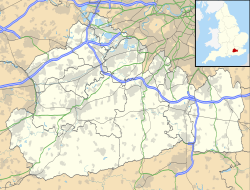The Thorndike Theatre, now known as the Leatherhead Theatre, is a Grade II listed building in Leatherhead, Surrey, England.[1] Roderick Ham designed the theatre within the shell of the disused 1930s Crescent Cinema. Named after Dame Sybil Thorndike, the theatre was opened on 17 September 1969 by Princess Margaret.[2][3]
 Leatherhead Theatre | |
| Former names | Thorndike Theatre |
|---|---|
| Location | Church Street, Leatherhead, Surrey |
| Coordinates | 51°17′42″N 0°19′43″W / 51.295074°N 0.328706°W |
| Type | Theatre |
| Capacity | 495 + 3 wheelchairs |
| Construction | |
| Built | 1967–1969 |
| Opened | 17 September 1969 |
| Architect | Roderick Ham |
| Website | |
| www | |
Listed Building – Grade II | |
| Official name | Thorndike Theatre |
| Designated | 8 July 1988 |
| Reference no. | 1028904 |
The theatre closed in 1997 after the loss of public funding. A charitable trust was set up to operate it and the theatre re-opened as the Leatherhead Theatre in 2001, with seating reduced to 495 plus three wheelchair places.[4]
History
editThe Thorndike Theatre opened in 1969 as a replacement for the 300-seat Ace Cinema in Leatherhead High Street. The cinema had originally been built in 1890 as the Victoria Hall[5] and as performances became more popular, its size had become restrictive and there was a need for a new and better-equipped performing arts venue in the town.[6]
The Thorndike Theatre, in Church Street, was designed by Roderick Ham in the modernist style.[7] It was rebuilt from the former Crescent Cinema, which was originally constructed in 1939 and which was run by a local family until the 1960s.[8][9] Although the exterior walls of the Crescent were retained, the interior, including the 526-seat auditorium and lobby, was built anew.[6] Named for the actor Sybil Thorndike, its construction was primarily paid for by private donations, with some additional funding from the Leatherhead Urban District Council and the Arts Council.[6] The building also included a studio theatre, the Casson Room, for smaller-scale performances including youth productions. The Thorndike Theatre was opened in September 1969 by Princess Margaret.[8][10]
Although it was initially popular, the Thorndike Theatre regularly ran operating deficits.[6] Following several years of cuts in public subsidy,[6] it launched an appeal for £350,000 in February 1988, which was supported by the playwright, Alan Ayckbourn, actors, Prunella Scales and Timothy West, and the local MP, Kenneth Baker.[11] The theatre briefly closed in July 1990,[12][13] but reopened three months later following a rescue bid led by the producer and businessman, Bill Kenwright.[14] It closed again in April 1997 with a total debt of almost £1.2 million.[6][15][16] A second reopening followed in October 1997,[17][18] but closed just over a month later after the new operators, Screenworks, entered voluntary liquidation owing £400,000.[19][20]
The theatre was Grade II-listed in July 1999.[21] It reopened in 2001 as a part-time theatre,[15] cinema, community space and meeting place for the evangelical group, Pioneer People.[7][8] The annual Leatherhead Drama Festival, for amateur theatre groups, was launched at the theatre in 2004 and ran for 16 years.[22]
References
edit- ^ Historic England (8 July 1999). "Thorndike Theatre (Grade II) (1387322)". National Heritage List for England.
- ^ "Thorndike Theatre, Leatherhead — The Twentieth Century Society".
- ^ "Leatherhead Theatre (ii)". The Theatres Trust.
- ^ "Information". Leatherhead Theatre. Retrieved 29 July 2020.
- ^ Vardey 1988, pp. 89, 194.
- ^ a b c d e f Turnbull 2008, pp. 129–131.
- ^ a b Calder, Barnabas (June 2004). "Thorndike Theatre, Leatherhead: Building of the Month". 20th Century Society. Archived from the original on 27 August 2021. Retrieved 27 August 2021.
- ^ a b c Vardey 2001, pp. 123–124.
- ^ Powell, Goff. "The Crescent Cinema, Church Street, Leatherhead" (PDF). Leatherhead & District Local History Society. Archived (PDF) from the original on 3 November 2021. Retrieved 3 November 2021.
- ^ "A royal day for theatre". Cobham News and Mail. No. 1742. 25 September 1969. p. 1.
- ^ "Theatre appeal backed". Leatherhead Advertiser. No. 5057. 18 February 1988. p. 16.
- ^ King, Debbie (13 June 1988). "It is curtains for theatre unless...". Leatherhead Advertiser. No. 5187. p. 1.
- ^ "Funds problem closes theatre". Surrey Herald. 26 July 1990. p. 30.
- ^ "£100,000 deal for theatre". Leatherhead Advertiser. No. 5192. 19 September 1990. p. 1.
- ^ a b "History". Leatherhead Theatre. Archived from the original on 11 September 2009. Retrieved 16 August 2009.
- ^ Gurney, David (10 April 1997). "Thorndike's shock debts". Leatherhead Advertiser. pp. 1, 3.
- ^ "Thorndike gets a spring clean". Leatherhead Advertiser. 2 October 1997. p. 1.
- ^ Fryer, Jennifer (23 October 1997). "Future looks rosy for revived theatre". Leatherhead Advertiser. p. 3.
- ^ Gurney, David (11 December 1997). "Second cash crisis closes Thorndike". Leatherhead Advertiser. p. 1.
- ^ Gurney, David (8 January 1998). "Theatre creditors told their investments lost". Leatherhead Advertiser. p. 9.
- ^ Gardner, Claire (8 July 1999). "Thorndike is listed but the doubts remain". Leatherhead Advertiser. p. 1.
- ^ "Leatherhead Drama Festival". Leatherhead Drama Festival. October 2021. Archived from the original on 16 November 2021. Retrieved 16 November 2021.
External links
editBibliography
edit- Turnbull, Olivia (2008). Bringing Down the House: The Crisis in Britain's Regional Theatres. Bristol: Intellect Books. ISBN 978-1-84-150208-3. Retrieved 16 November 2021.
- Vardey, Edwina, ed. (1988). History of Leatherhead : a town at the crossroads. Leatherhead: Leatherhead and District Local History Society. ISBN 978-0-95-060091-8.
- Vardey, Edwina (2001). Leatherhead: A history. Chichester: Phillimore. ISBN 1-86077-189-0.
